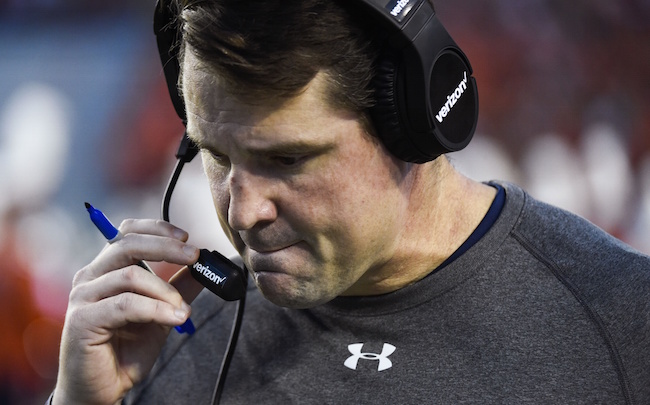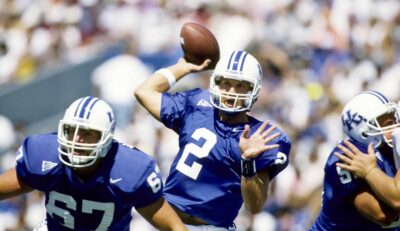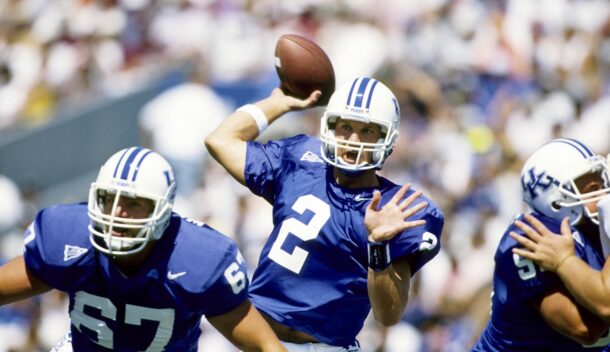
Will Muschamp washed out in his first head coaching opportunity. The South Carolina Gamecocks took a huge step back in 2015.
So, if not because of failed attempts to hire other coaches leading to a panic hire, why would South Carolina athletic director Ray Tanner place his bet on Muschamp to be the right coach to lead the Gamecocks back into SEC title contention?
Because Muschamp is a good fit in Columbia, and he has surrounded himself with a well-rounded coaching staff capable of recruiting talented defensive prospects, then developing them. And believe it or not, also on offense.
From Spurrier to Muschamp
The Steve Spurrier era came to a screeching halt at South Carolina in the middle of the 2015 season. After leading the program through its most successful period in history — 33 wins across three seasons from 2011-13 — the Head Ball Coach seemed to run out of gas, and his team suffered as a result. The Gamecocks slumped to a 7-6 record in 2014, then were 2-4 during the ’15 campaign when Spurrier called it quits.
Energetic assistant Shawn Elliott took over and spurred South Carolina to a victory over Vanderbilt, but fell short in five close losses to end the season. During that time, the team suffered a 23-22 loss to in-state FCS program The Citadel that will go down as the most embarrassing in recent memory, if not school history.
While the Gamecocks were struggling on the field, which cost Elliott any real opportunity to hold onto the job full-time, Tanner was evaluating his options. Rising stars like Houston head coach Tom Herman and Memphis’ Justin Fuente were expected to be in the mix early, and by December, established head coaches such as Mark Richt, Rich Rodriguez, Sonny Dykes and Greg Schiano were rumored to be in line to interview, as well as a few high-profile coordinators like Kirby Smart.
Of course, when the dust settled, Tanner announced Muschamp as the program’s new head coach.
While likely not Tanner’s top choice (Herman was close to an agreement, but got cold feet after the Gamecocks lost to The Citadel, according to Dan Wolken of USA Today), Muschamp is a perfect fit and has already laid out a plan for a turnaround in Columbia.
It started off the field — on the phones, in the high school hallways and in the living rooms of talented prospects.
“… I can sell ice to an Eskimo.” So can T-Rob, B-Mac and Thompson
Muschamp’s top priority upon arriving in Columbia was recruiting, and rightfully so. National Signing Day came less than two months after he was officially hired, and South Carolina struggled to identify, sign and develop talent at the end of the Spurrier era.
At his introductory press conference, Muschamp pointed to his strong track record on the recruiting trail, even pointing out his wife as an example of his salesmanship.
Muschamp explicitly prioritized recruiting ability as he built his coaching staff.
Travaris Robinson was a graduate assistant at Auburn during Muschamp’s first stint as the defensive coordinator for the Tigers, and T-Rob has been Muschamp’s right-hand man since joining the Florida staff as defensive backs coach in 2011. Robinson followed Muschamp back to Auburn (his alma mater) in the same role before he finally earned a shot to be the defensive coordinator for the Gamecocks.
Robinson is Muschamp’s Kirby Smart, who coached with Muschamp at Valdosta State, then at LSU and with the Miami Dolphins, where both worked for Nick Saban. Smart spend nine years as an assistant at Alabama under Saban, including eight as defensive coordinator, before finally leaving for the head job at Georgia. Assuming all goes well at South Carolina, Robinson’s next job will be as a head coach.
T-Rob also will help define where the Gamecocks concentrate their recruiting efforts. Muschamp has mentioned the need to beat Clemson for South Carolina’s best high school recruits, much like Spurrier did when building his best teams. But Muschamp and Robinson have built their recruiting reputations farther south.
A Miami native, Robinson excels recruiting the Sunshine State. In his four seasons with the Gators, T-Rob was the primary recruiter for 12 Florida signees labeled as four-star prospects or higher. That included five-star cornerback Vernon Hargreaves III, a consensus All-American in 2015 who should be a first-round pick in the 2016 NFL draft.
At Auburn, Robinson was a major factor in the late signings of talented Florida defensive backs Tim Irvin and Carlton Davis. Irvin, who flipped from Texas before choosing Auburn, started for the Tigers in Week 1 and played in 10 games as a true freshman. Davis, a former Ohio State commit, pushed his way into the starting lineup and emerged as an SEC All-Freshman cornerback.
Muschamp also has a strong record of success recruiting Florida, helping Auburn to land touted defensive end Byron Cowart, Jeffrey Holland and Ryan Davis out of the Sunshine State in 2015. His recruiting classes as the head coach at Florida ranked seventh in the country on average. As a result, it’s reasonable to expect the Gamecocks to concentrate more heavily there than Spurrier’s staff did.
South Carolina’s spring roster lists 14 players from Florida, 17 from Georgia with a combined 20 other out-of-state players. Those hometowns reach north to Virginia and Pennsylvania, among other states that are relatively uncommon recruiting territory in the SEC. The five South Carolina recruiting classes prior to Muschamp’s hire each ranked in the top 20 nationally, but the Gamecocks have consistently fallen into the middle of the pack in the SEC in talent rankings.
Casting a wider net to the south could help South Carolina jump closer toward the top of the league’s recruiting standings. Muschamp won’t shift the Gamecocks’ recruiting base completely. He made a huge move that will pay off in nearby Georgia by landing Bryan McClendon as his co-offensive coordinator and receivers coach. McClendon, who played at Georgia and coached there for Mark Richt, has a strong recruiting reputation as well and served as the recruiting coordinator for the Bulldogs in 2014-15.
McClendon was listed as the primary recruiter for some of the Bulldogs’ highest-rated prospects, including running backs Todd Gurley, Nick Chubb, Keith Marshall and Isaiah Crowell, as well as five-star linebacker Lorenzo Carter. In 2014, B-Mac earned National Recruiter of the Year honors from 247Sports.
And, perhaps the most underrated coach on staff is Lance Thompson, who will coach the Gamecocks defensive line after spending one year with outside linebackers at Auburn. The interim defensive coordinator for the Tigers in the Birmingham Bowl, Thompson wasn’t offered a promotion from Gus Malzahn after Muschamp left town, and decided to follow Muschamp to Columbia.
Thompson coached at Alabama three times, including two stints under Saban, with whom he also worked at LSU. He’s credited with landing some of the best players in recent Crimson Tide history, including Julio Jones, Trent Richardson, D.J. Fluker and AJ McCarron. In 2008, Rivals named Thompson the National Recruiter of the Year, and ESPN did the same in 2014. Thompson is also a winner, having collected national championship in three decades, including Alabama (2012), LSU (2003) and Georgia Tech (1990).
Muschamp, Robinson, McClendon, Thompson and the rest of the staff (including Elliott, who stayed on to coach the offensive line) got off to a good start with the 2016 recruiting class. After being ranked No. 71 in the nation by Rivals when Muschamp was hired, South Carolina jumped all the way to No. 26 on Signing Day. South Carolina signed a total of 26 players – a rather large number for a new head coach. The team also managed to retain four-star dual-threat quarterback Brandon McIlwain.
Recruiting is a never-ending process. As soon as one class is signed, the next becomes a top priority in the hours a coach doesn’t spend on the practice field or in the office watching film. But, for Muschamp to be a success at South Carolina, he’ll need much more than just a talented roster. After all, Florida was one of the most talented programs in the SEC during his tenure there.
The key is to continue to develop those players so they execute their responsibilities on Saturdays – something Muschamp wasn’t able to do for the Gators offense.
Kurt Roper, Malzahn’s influence, and a well-rounded staff
A longtime defensive coordinator, Muschamp coached stints under Saban at LSU and with the Dolphins, in addition to later jobs at Auburn and Texas (and led top-10 units at each college stop). Defense is Muschamp’s bread-and-butter, and the Gamecocks are sure to improve under his direction.
It’s true that his most recent Auburn unit was among the worst of his career statistically. The Tigers allowed 405.2 total yards per game in 2015 (only South Carolina was worse), but the unit improved during the course of the season. It allowed 372.9 total yards across the final four regular-season games. Robinson is a first-time coordinator, but he knows Muschamp’s system better than anyone, and the head coach is sure to be heavily involved in the defensive game-planning and likely the game day play-calling as well.
The bigger concern is offense.
“I wish I had a dollar for every time someone has asked me what I’ve learned,” Muschamp told Wolken in February. “What did I learn? You need to score more points. It’s real simple. We’re not splitting the atom.”
Muschamp posted a 28-21 record in four seasons as the head coach at Florida, and was fired following a 10-13 record in 2013 and 2014. The ’13 campaign included Muschamp’s own embarrassing FCS loss (26-20 to Georgia Southern) and it was the first losing season for the Gators since 1979.
Florida played solid defense under Muschamp. Opponents scored an average of 19.3 points and produced an average of 307.8 total yards during his four seasons. But a boring and ineffective offense doomed him.
From 2011 to 2014, Florida averaged 25.3 points per game, including a low of 18.8 points on average during the disastrous 4-8 ’13 campaign, ranking dead last in the SEC in total offense. The Gators never finished higher 1oth in the SEC in total offense during that time.
In his final year in Gainesville, Muschamp inserted Kurt Roper into the offensive coordinator role. The numbers improved dramatically as Florida’s 30.3 points per game and 367.6 total yards were the most for a Muschamp-coached team by a wide margin, but they ranked No. 8 and No. 12 in the SEC both categories, respectively. It was too little, too late as the Gators finished 6-5 during the regular season and Muschamp was canned.
Roper spent the 2015 season working with the Cleveland Browns, where he surely discussed his fair share of South Carolina football with Gamecocks legend and Browns backup quarterback Connor Shaw. Feeling like Roper was on the right track in Gainesville, but ran out of time to help the Gators make it over the hump, Muschamp decided to bring Roper back to run his offense at South Carolina.
The hire raised a lot of eyebrows. After all, as good as Roper was as the offensive coordinator at Duke under David Cutcliffe from 2008-13, only one of his offenses ranked in the top four of the ACC and only two averaged more than 400 yards per game for an entire season. But the hire again shows Muschamp’s deliberate planning. He wanted a coach with him he was familiar and with whom he worked well. Someone with a philosophical belief in an up-tempo offense.
Muschamp spent the 2015 season at Auburn, in part, because he wanted to learn more about the hurry-up, no huddle offense from Gus Malzahn.
“I was able to sit back and see how he administers some things,” Muschamp said in his introductory press conference in December. “That’s really the identity we want to have. We want to be on the ball; we want to be fast; and we want to be physical. We want to spread the field; we want to make them defend 53 1/3 yards wide and 120 yards down the field.”
Though the Tigers struggled on the field — Auburn ranked No. 10 in the SEC with an average of 370.0 total yards per game — Muschamp had an opportunity to discuss offensive philosophy with one of the most respected offensive minds.
Muscham also brought along Bobby Bentley (Auburn offensive analyst from 2014-15 and a four-time state championship high school coach in South Carolina) to coach running backs and Pat Washington (won a national championship at Tennessee and spent the last three years at Missouri) to coach tight ends.
Roper’s experience, McClendon’s Georgia ties and recruiting résumé, the Auburn ties and South Carolina high school roots of Bentley, and the continuity and enthusiasm of Elliott combine to form one of the most well-rounded offensive staffs in the league.
The same can be said for the defense. In addition to Muschamp, Robinson and Thompson, South Carolina added former Florida and Boston College assistant Coleman Hutzler to coach special teams and linebackers.
Finally, Muschamp hired former Florida strength and conditioning coordinator and 14-year NFL veteran linebacker Mike Peterson to coach outside linebackers.
Time will tell whether Muschamp’s blueprint for success at South Carolina will lead to the first SEC championship in program history, or even if he can put together a string of success similar to the one Spurrier enjoyed before burning out.
But with his well-orchestrated approach to recruiting, his history of success coaching defense, the insight he gained at Auburn and the foundation he built with Roper at Florida, Muschamp is capable of leading a turnaround in Columbia.







